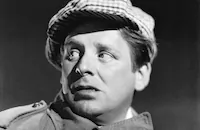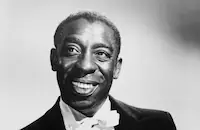She Couldn't Say No

Brief Synopsis
Cast & Crew
Lloyd Bacon
Robert Mitchum
Jean Simmons
Arthur Hunnicutt
Edgar Buchanan
Wallace Ford
Film Details
Technical Specs

Synopsis
Soon after returning to America from England, where she lived for many years, oil heiress Corby Lane buys a car and heads for Progress, Arkansas. Upon arriving there, Corby, who is intent on repaying the town for helping her father obtain a life-saving operation for her when she was two, inquires about Dr. Robert Sellers, her childhood physician. Finding the doctor not at home, Corby pushes the "emergency only" button next to his front door, causing a loud alarm to sound. At a nearby river, "Doc," who has just snagged the elusive fish Hercules, hears the noise and, abandoning his catch, races back to his house. Though irritated by Corby's impatience, Doc invites her to his office. Corby, who is startled by Doc's youth, introduces herself as "Miss Johnson" and claims that she is on her way to California. Corby then asks Doc what he would do if she gave him $5,000, and after he replies that he would lock her up as a lunatic, she announces that she is staying in Progress for a few days. The bemused Doc helps Corby settle in at Mrs. McMurty's boardinghouse, then invites her out that evening. At Harley's Tavern, Doc gets Corby drunk on moonshine and tries to trick her into revealing her true identity. Before he gets very far, however, he is summoned to the Jordan farm to deliver a baby. At Doc's insistence, the intoxicated Corby goes along and makes a mental note when new father Dick offers to pay Doc with hogs. The next morning, a hungover Corby chats with fellow boarder Otey Chalmers, who happily admits he is the town drunk and is grateful for the bad moonshine Harley supplies him. Meanwhile, Doc and his young friend, Digger, drop by the Jordan farm and are shocked to find Dick knee-deep in baby supplies, which have been sent by an anonymous donor. Instead of being grateful for the gift, Dick worries about how his wife Barbara will react to the immense clutter. Just then, Doc is called to Mrs. McMurty's and learns that Otey received a case of scotch and collapsed in his room shortly after. Doc treats Otey for alcohol poisoning and complains to Corby about the "idiotic Santa Claus" who sent him good liquor. To Corby's dismay, Doc and Sally Watson, his smitten neighbor, then go out on their regular Friday night movie date. When Doc returns home, Digger tells him that he snuck a peek at Corby's car registration and knows that her real name is Lane. Doc looks Corby up in his deceased father's files and finds that, twenty years before, the town took up a collection to pay for her operation. Despite the late hour, Doc invites Corby for an ice cream soda at Ad Meeker's general store and, after revealing he knows her identity, kisses her. Doc then tells Corby that, like the rest of Progress, the Jordans prefer bartering to paying cash, and that Harley has been cutting Otey's moonshine with water in order to wean him from alcohol. When Doc suddenly proposes marriage, Corby is infuriated by his "presumptuousness" and throws her jacket at him before storming out. Unaware that the jacket landed in the rummage sale bin, Corby is stunned to see Sally wearing the coat at church on Sunday and assumes that Doc gave it to her. Later, Doc hears that veterinarian Joe Whelan is fulfilling his life-long dream of moving to California, as someone has given him a car. Because Joe is the only vet in the area, Doc files theft charges against him to keep him in Progress. When Joe angrily demands his freedom, however, Doc relents and drops the charges. At the river, Doc confronts Corby, who is fishing with Digger, and while he accuses her of meddling, she demands to know how Sally got her jacket. After the two push each other into the water, Doc leaves to tend to a sick hog. Soon after, every one in town receives an envelope containing thousands of dollars in cash, and Progress' windfall becomes national news. Now flush, Sally departs for business school in St. Louis, while Otey announces he is "taking the cure" in Kansas City. Before Otey can get out of town, however, the place is besieged with anxious people looking for easy money. Finally realizing the folly of her good intentions, Corby confesses all to the growing crowd, but is met with hostility. When a fight breaks out, Doc shows up to stop it and apologizes to the people, who then leave town without further incident. Later, Corby rings Doc's emergency bell, and after he again drops Hercules and comes running, she apologizes for her foolishness. Doc then proposes, and Corby accepts with a kiss.

Director

Lloyd Bacon
Cast

Robert Mitchum

Jean Simmons

Arthur Hunnicutt

Edgar Buchanan

Wallace Ford

Raymond Walburn
Jimmy Hunt
Ralph Dumke

Hope Landin
Gus Schilling
Eleanor Todd
Pinky Tomlin
Burt Mustin
Edith Leslie
Martha Wentworth
Gloria Winters
Barry Brooks
Wallis Clark
Florence Lake
Tol Avery

Clarence Muse
Maxie Thrower
Dabbs Greer
Keith Hetherington

Dan White

Jonathan Hale
James Craven
Bob Hopkins
Charles Watts
Ruth Packard
Charles Cane
Marjorie Holliday
Tony Merrill
Marlyn Gladstone
Mary Bayless
Joy Hallward
Morgan Brown
Clyde Courtright
Coleman Francis
Mike Lally
Leo Sulky
Teddy Mangean
Sammy Shack
Carl Sklover
Charles Sullivan
Crew
George Amy
C. Bakaleinikoff
D. D. Beauchamp
Mel Berns
William Bowers
Carroll Clark
Albert S. D'agostino
Fred A. Fleck
Richard Flournoy
Larry Germain
Sam Gold
Howard Hughes
Ed Killy
Harley Miller
Clem Portman
Grayson Rogers
Francis Sarver
Darrell Silvera
Robert Sparks
Roy Webb
Harry J. Wild
Michael Woulfe

Videos
Movie Clip
Trailer
Film Details
Technical Specs

Articles
She Couldn't Say No
She Couldn't Say No was one of two RKO films Simmons and Mitchum made together. Its release also marked the end of Simmons' bizarre and complicated period under contract to the bizarre and complicated Howard Hughes. Simmons had been one of Great Britain's top stars when she left England in 1950 to join her future husband, actor Stewart Granger, who had just signed a contract with MGM. Shortly after she arrived in Hollywood, Simmons found out that Hughes had bought out her contract with Britain's J. Arthur Rank without telling her. Although her Rank contract had only six months to run, Simmons' agent told her that unless she signed a seven-year contract with Hughes, the tycoon would destroy her career by putting her in bad films. Not only that, but according to Granger's autobiography, it soon became clear that Hughes' interest in Simmons was more personal than professional. Newly married and in love with her husband, she resisted Hughes' advances. Things got so bad that at one point, a drunken Granger hatched a plot to murder Hughes. Simmons and Granger sued Hughes to limit her contract with him to three films, and for the right to make films for other studios between the RKO films.
Hughes then made Simmons' life difficult for the duration of her contract. All three films were made quickly, one after the other, in 1952. The first one with Mitchum, Angel Face (1952), gave Simmons a good role as a psychotic woman who murders her parents. But Hughes reportedly encouraged director Otto Preminger, who could be sadistic with actors, to bully Simmons throughout production, often reducing her to tears. Affair with a Stranger (1953) and She Couldn't Say No suffered from weak scripts, and the latter had a director - Lloyd Bacon - who was well past his prime.
Bacon had been working in films since 1913, and directing since 1926. He had directed some of the early Warner Brothers musicals like 42nd Street (1933) and Footlight Parade (1933). In fact, one of his early musicals was also called She Couldn't Say No (1930), although it had nothing in common with the 1954 film except the title. (That title has been used for two additional films, also with different stories.) Bacon had been one of Hollywood's most prolific and versatile studio directors, churning out 100 films of every genre, including biographies, comedies, and war films. But his later films were undistinguished. His final film, also an RKO-Hughes production, The French Line (1954), caused controversy because of star Jane Russell's revealing costumes.
Although She Couldn't Say No had been shot in 1952, Hughes tinkered with it for 16 months before releasing it. He tried out several titles, including Beautiful But Dangerous, Enough for Happiness, and She Had to Say Yes, before settling on She Couldn't Say No. When it was finally released, critics praised the stars, but most agreed with the Newsweek critic, who wrote that it "wastes the talents of two of Hollywood's finest properties." The Time critic called it "a hymn to a sexy title. It is sung in the praise of small-town life, but there are rather too many verses, and the performers do not seem to know the tune."
By the time She Couldn't Say No opened, the legal battle was over. Simmons won the case, and reportedly was awarded damages of $250,000 for the stress and aggravation Hughes had inflicted on her. She Couldn't Say No was also Mitchum's final RKO release. Both stars went on to make excellent films in the 1950s and 60s, and one more together, The Grass Is Greener (1960). By then, RKO was long gone. Hughes sold the company in the mid-1950s, and the RKO Hollywood lot became the home of Desilu, Lucille Ball and Desi Arnaz's production company.
Director: Lloyd Bacon
Producer: Howard Hughes, Robert Sparks
Screenplay: D.D. Beauchamp, William Bowers, Richard Flournoy, based on the story "Enough for Happiness" by D.D. Beauchamp
Cinematography: Harry J. Wild
Editor: George Amy
Art Direction: Albert S. D'Agostino, Carroll Clark
Music: Constantin Bakaleinikoff
Principal Cast: Robert Mitchum (Doc), Jean Simmons (Corby Lane), Arthur Hunnicutt (Otley), Edgar Buchanan (Ed Meeker), Wallace Ford (Joe), Raymond Walburn (Judge Hobart), Jimmy Hunt (Digger), Ralph Dumke (Sheriff).
BW-89m. Closed captioning.
by Margarita Landazuri

She Couldn't Say No
Quotes
Trivia
Notes
The working titles of this film were Enough for Happiness, A Likely Story, It's a Likely Story, Murder, She Had to Say Yes and Beautiful but Dangerous. According to a late April 1952 Daily Variety news item, RKO changed the title from It's a Likely Story to Beautiful but Dangerous to avoid confusion with its 1946 release A Likely Story. In August 1951, Daily Variety reported that Paramount had purchased the story as a vehicle for William Holden. According to a Daily Variety news item, Dick Powell was to slated to direct the picture. In April 1952, Los Angeles Examiner announced that Paramount had sold the script to RKO because of Holden's scheduling conflicts. The same item noted that the purchase marked RKO's return to production after more than 100 employees were dismissed from the studio.
A Hollywood Reporter news item adds Tom Young, Art Shurr, Ben Lee and Harry Waldo to the cast, but their participation in the final film has not been confirmed. Although She Couldn't Say No was not the last picture Robert Mitchum made at at RKO, the studio at which he had been under contract for many years, it was the last RKO release to star him. According to modern sources, Mitchum disliked the script so much he went on suspension to avoid acting in it.

Miscellaneous Notes
Released in United States Winter January 1954
Released in United States Winter January 1954















